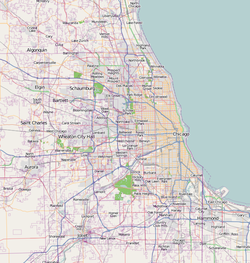Chicago Theater

Chicago Theatre's Facade in April 2009, as viewed from State Street.
|
|
| Address | 175 N. State Street Chicago, Illinois United States |
|---|---|
| Owner | The Madison Square Garden Company |
| Capacity | 3,600 |
| Current use | music venue |
| Opened | 1921 |
| Website | |
|
Balaban and Katz Chicago Theatre
|
|
| Coordinates | 41°53′7″N 87°37′40″W / 41.88528°N 87.62778°WCoordinates: 41°53′7″N 87°37′40″W / 41.88528°N 87.62778°W |
| Area | less than one acre |
| Architect | Rapp & Rapp |
| Architectural style | Neo-Baroque/Neoclassical (exterior);French Baroque (Neo-Baroque)(interior) |
| NRHP reference # | 79000822 |
| Significant dates | |
| Added to NRHP | June 6, 1979 |
| Designated CL | January 28, 1983 |
The Chicago Theatre, originally known as the Balaban and Katz Chicago Theatre, is a landmark theater located on North State Street in the Loop area of Chicago, Illinois, in the United States. Built in 1921, the Chicago Theatre was the flagship for the Balaban and Katz (B&K) group of theaters run by A. J. Balaban, his brother Barney Balaban and partner Sam Katz. Along with the other B&K theaters, from 1925 to 1945 the Chicago Theatre was a dominant movie theater enterprise. Currently, Madison Square Garden, Inc. owns and operates the Chicago Theatre as a performing arts venue for stage plays, magic shows, comedy, speeches, and popular music concerts.
The building was added to the National Register of Historic Places June 6, 1979, and was listed as a Chicago Landmark January 28, 1983. The distinctive Chicago Theatre marquee, "an unofficial emblem of the city", appears frequently in film, television, artwork, and photography.
Abe and Barney Balaban, together with Sam and Morris Katz—founders of the Balaban and Katz theater chain, built the Chicago Theatre in 1921 as one of a large chain of opulent motion picture houses. The theater would become the flagship for 28 theaters in the city and over 100 others in the Midwestern United States that B&K operated in conjunction with the Paramount Publix chain.Cornelius W. Rapp and George L. Rapp were primary architects and the final construction cost was $4 million ($53.7 million in 2016 dollars). The Rapp brothers also designed many other B&K properties in Chicago, including the Oriental and Uptown Theatres. Preceded by the now-demolished Tivoli Theatre of Chicago and Capitol Theatre of New York City, the Chicago Theatre was the "...largest, most costly and grandest of the super deluxe movie palaces" built up to that date and thus now the oldest surviving grand movie palace. The Chicago Theatre was among the earliest theaters in the nation to be built in Rapp and Rapp's signature Neo-Baroque French-revival style. It is the oldest surviving example of this style in Chicago.
...
Wikipedia

